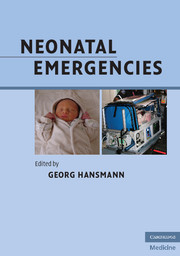Book contents
- Frontmatter
- Contents
- List of contributors
- Foreword (1)
- Foreword (2)
- Preface
- Acknowledgments
- Section 1 Organization of neonatal transport
- Section 2 Basics in cardiopulmonary resuscitation of newborn infants
- Section 3 Classic and rare scenarios in the neonatal period
- Management of healthy, term newborn infants (vaginal delivery, cesarean section, vacuum extraction, forceps delivery)
- Management of preterm and moderately depressed term newborn infants with a birth weight ≥1500 g
- Management of very preterm newborn infants (VLBW, ELBW)
- Twin–twin (feto–fetal) transfusion syndrome
- An apparently trivial call from the term baby nursery
- Out of hospital birth
- Hypoglycemia
- Meconium aspiration
- Chorioamnionitis and early-onset sepsis in the newborn infant
- Perinatal hemorrhage
- Perinatal hypoxia-ischemia
- Cerebral seizures
- Infants born to mothers on psychoactive substances
- Prenatal and postnatal arrhythmias
- Critical congenital cardiovascular defects
- Patent ductus arteriosus of the preterm infant
- Persistent pulmonary hypertension of the newborn (PPHN)
- Congenital diaphragmatic hernia
- Pneumothorax
- Congenital cystic adenomatoid malformation of the lung (CAM, CCAM)
- Chylothorax
- Hemolytic disease of the newborn
- Hydrops fetalis
- Choanal atresia
- Esophageal atresia
- Gastrointestinal obstruction
- Necrotizing enterocolitis (NEC)
- Omphalocele and gastroschisis
- Neural tube defects
- Cleft palate
- Birth trauma: brachial plexus palsy, facial nerve palsy, clavicular fracture, skull fracture, intracranial and subperiosteal hemorrhage (cephalohematoma)
- Sudden infant death syndrome (SIDS)
- Questions for review
- References (Section 3)
- Section 4 Transport
- Section 5 Appendix
- Index
- Plate section
Infants born to mothers on psychoactive substances
from Section 3 - Classic and rare scenarios in the neonatal period
Published online by Cambridge University Press: 05 March 2012
- Frontmatter
- Contents
- List of contributors
- Foreword (1)
- Foreword (2)
- Preface
- Acknowledgments
- Section 1 Organization of neonatal transport
- Section 2 Basics in cardiopulmonary resuscitation of newborn infants
- Section 3 Classic and rare scenarios in the neonatal period
- Management of healthy, term newborn infants (vaginal delivery, cesarean section, vacuum extraction, forceps delivery)
- Management of preterm and moderately depressed term newborn infants with a birth weight ≥1500 g
- Management of very preterm newborn infants (VLBW, ELBW)
- Twin–twin (feto–fetal) transfusion syndrome
- An apparently trivial call from the term baby nursery
- Out of hospital birth
- Hypoglycemia
- Meconium aspiration
- Chorioamnionitis and early-onset sepsis in the newborn infant
- Perinatal hemorrhage
- Perinatal hypoxia-ischemia
- Cerebral seizures
- Infants born to mothers on psychoactive substances
- Prenatal and postnatal arrhythmias
- Critical congenital cardiovascular defects
- Patent ductus arteriosus of the preterm infant
- Persistent pulmonary hypertension of the newborn (PPHN)
- Congenital diaphragmatic hernia
- Pneumothorax
- Congenital cystic adenomatoid malformation of the lung (CAM, CCAM)
- Chylothorax
- Hemolytic disease of the newborn
- Hydrops fetalis
- Choanal atresia
- Esophageal atresia
- Gastrointestinal obstruction
- Necrotizing enterocolitis (NEC)
- Omphalocele and gastroschisis
- Neural tube defects
- Cleft palate
- Birth trauma: brachial plexus palsy, facial nerve palsy, clavicular fracture, skull fracture, intracranial and subperiosteal hemorrhage (cephalohematoma)
- Sudden infant death syndrome (SIDS)
- Questions for review
- References (Section 3)
- Section 4 Transport
- Section 5 Appendix
- Index
- Plate section
Summary
Epidemiology
Abuse of legal psychoactive substances (alcohol, nicotine) during pregnancy is far more common than use of illicit drugs
Incidence and choice of drugs show strong regional variability. Maternal substance abuse is seen in all socio-economic classes, ages, and races, but there is increased risk in younger women, unmarried women, and women with lower educational achievements
Many mothers on psychoactive substances use more than one drug. Women on methadone or buprenorphine substitution may still use heroin or other illicits drugs
Every effort should be made to stop consumption of alcohol, benzodiazepines, phencyclidine, and cocaine during pregnancy and to cut down on smoking cigarettes
In contrast, avoid withdrawal from opioids (risks of miscarriage in the first trimester, premature labor in the third trimester, fetal distress and fetal intrauterine death close to term)
Selective serotonin reuptake inhibitors (SSRI) are also commonly prescribed during pregnancy to women with symptoms of depression. Attempts to change an effective medication are contraindicated shortly before and after delivery (mood swings are very common around the time of childbirth, even in women without a history of depression), and women who have been taking a particular SSRI for most of the pregnancy should continue to do so after the baby is born. Women who discontinue antidepressants during pregnancy have about five times the risk for depression relapse than those who continue to take the medications. However, the risk of persistent pulmonary hypertension of the newborn (PPHN) is about sixfold increased in newborns whose mothers used SSRI after 20 weeks of gestation, with an overall incidence of approximately 6 to 12 per 1000 exposed women
- Type
- Chapter
- Information
- Neonatal Emergencies , pp. 322 - 324Publisher: Cambridge University PressPrint publication year: 2009



